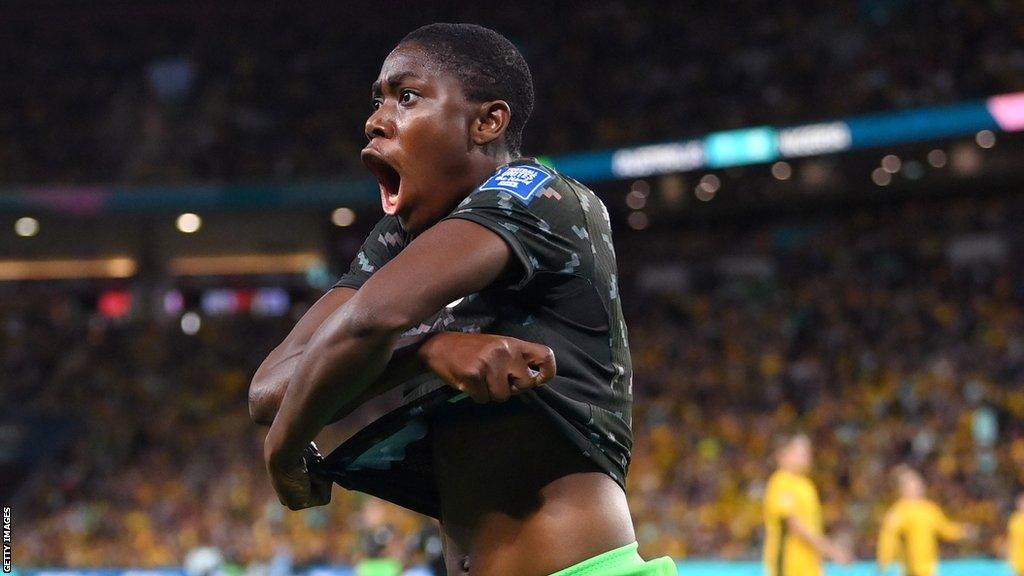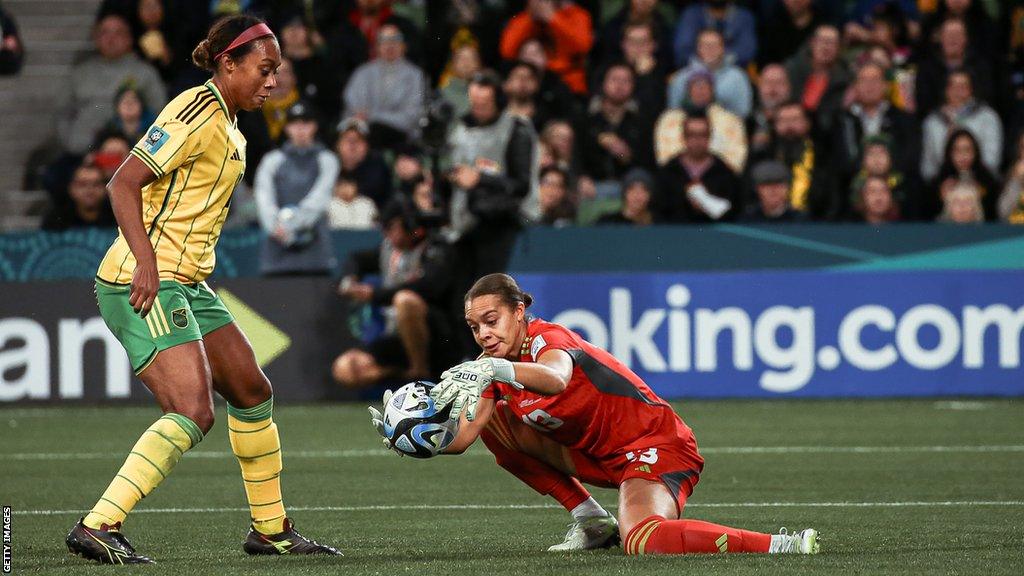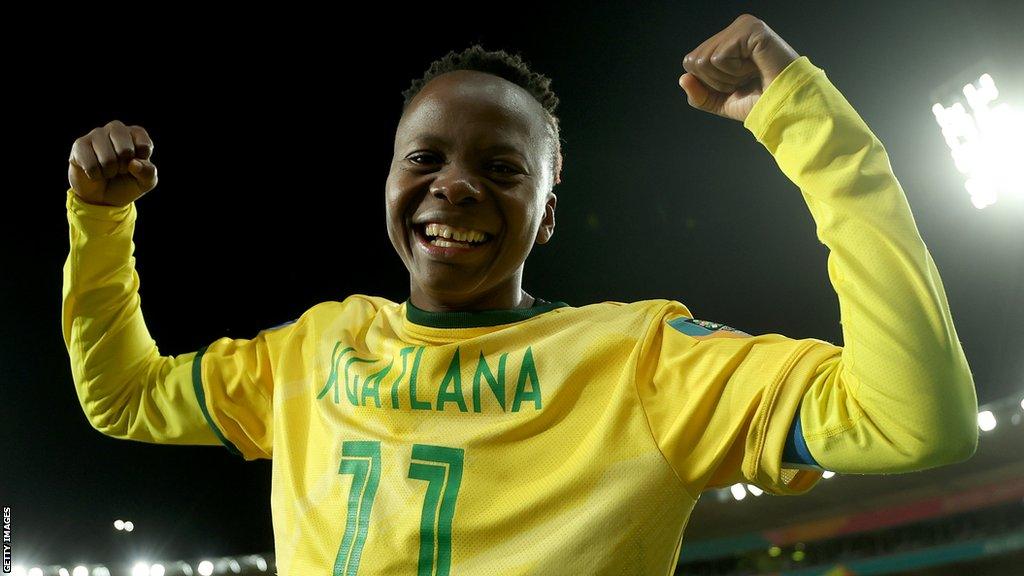Women's World Cup: Jamaica, Nigeria and South Africa impress on the pitch - and fight for respect off it
- Published

Nigeria, powered by striker Asisat Oshoala, qualified unbeaten from Group B
"You just wonder what these teams could do if their federations actually backed them."
The question posed by Rebecca Smith, former New Zealand international turned Fifa administrator, is one being contemplated by many women's football fans, pundits and journalists following the group stage of the 2023 World Cup.
On the pitch, this competition has been thrilling - producing some of the biggest upsets in women's football history.
Three of the top 10 sides in the current Fifa rankings - Germany, Canada and Brazil - have gone out in the group stage. Of the 16 teams into the knockouts, six are ranked outside the top 20.
This includes Jamaica - the first Caribbean side to compete in Fifa World Cup knockouts since Cuba in 1938 - as well as South Africa and Nigeria, two of three African sides in the last 16. Never have so many African teams reached this stage of a women's or men's World Cup.
And they have all deserved it - whether through thrilling attacking football, astute defensive tactics, or late goals scored thanks to a never-give-in attitude.
"This is amazing," Smith told BBC World Service. "It's not only that they have got out of their groups, but they've done it in style, they've done it showing they can play and compete with some of the best teams on the world stage.
"Jamaica have not conceded a goal in this tournament. That is a feat in and within itself. For South Africa as well, we don't often see the African countries doing that well and progressing into the deeper stages of the tournament."
South Africa, having been denied a point against powerhouses Sweden through a late goal before losing a two-goal advantage to Argentina, stunned Italy 3-2 with a stoppage-time winner to seal second place in Group G and a meeting with 2019 finalists Netherlands.
Having drawn with France and then earned a hard-fought 1-0 win over Panama, Jamaica secured qualification from Group F with a 0-0 draw against Brazil, who were eliminated.
Nigeria stunned hosts Australia with a comeback 3-2 victory, between battling out stalemates with Canada and the Republic of Ireland. They face England next.
Sacked managers, poor facilities and missing bonuses

Jamaica goalkeeper Becky Spencer did not concede once during the group stage
There is a greater underlying theme tying these three national teams together, however. They have not only conquered great odds on the field; they have had to battle them off the pitch too.
Jamaica manager Lorne Donaldson, assistant coach for the Reggae Girlz's debut at the 2019 World Cup, stepped up in July 2022 shortly before the Concacaf W Championship - the North American equivalent of the European Championship, which also doubled as the World Cup qualifiers - after the players called for the resignation of predecessor Vin Blaine in a joint letter to the Jamaican Football Federation.
Donaldson guided them through, but that was not the end of Jamaica's troubles. Another letter was sent in June this year from the team, expressing concerns over facilities and preparation.
So concerned were the team, they began to seek independent funding while at their pre-tournament training camp in Amsterdam, to allow them to prepare professionally for the biggest matches of their lives.
Two online crowdfunders were set up to help the team - one of them by the mother of midfielder Havana Solaun.
Some of the money came from Cedella Marley - daughter of reggae legend Bob Marley - who has been a major source of funding and outspoken support for the team.
Financial issues are also the source of off-field strife for Nigeria - specifically bonuses.
Nigeria have long-running problems in this area. At the 2022 Women's Africa Cup of Nations, they threatened to boycott their third-place play-off against Zambia after the Nigerian Football Federation (NFF) withheld payments of around $10,000.
Those problems arose again at the World Cup, with the NFF refusing to pay bonuses after Fifa announced all players would receive around £15,760 for participation in the group stages of the tournament.
There was even talk of Nigeria refusing to play their opening game against Canada in Australia, although they eventually relented.
'These women deserve backing'

Thembi Kgatlana scored in stoppage time to secure South Africa's crucial victory over Italy
South African and Jamaican players are also unhappy at a lack of payment from their national associations.
The players will receive at least $50,000 each from Fifa for reaching the last 16 at the World Cup, but nothing from the South Africa Football Association (SAFA).
This is a wider issue than just these three teams - England are in a similar dispute with their FA - but the problems for the nations with less-established history on the world football stage are deeper.
South Africa - a country aiming to host the next World Cup in 2027 - had to field a 13-year-old girl in a key World Cup warm-up friendly against Botswana because of a player boycott.
Senior players were unhappy that the friendly was being played at Tsakane Stadium, 31 miles southeast of Johannesburg, on a pitch made of clay and grass. The venue does not host games in the national Premier Soccer League.
Amid fears the surface could cause injury just weeks before the World Cup, the regular squad did not play.
It is against this backdrop that many of the thrilling upsets at the Women's World Cup are happening. While it makes them all the more remarkable, they also illustrate how far women's football around the world has to go to be treated with respect.
"It shouldn't be that the backing and the funding of the federation is dependent on the success of the team of the national team," said Smith. "These national teams have worked hard, these women deserve to have backing and funding regardless.
"They are getting more money from Fifa for preparation. There's no excuse for these federations not to be backing and funding their national teams properly, and supporting these women who are representing their country equal to the men.
"It's unfair, it's not a positive situation but I think the fact that they are winning is waking the country up and potentially rallying the population to force the federation into funding and supporting them more, which can only be a good thing."